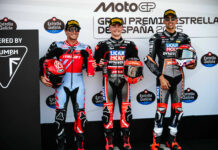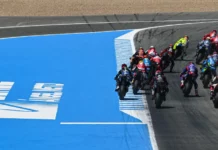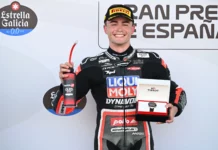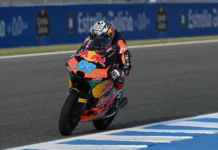Portuguese Grand Prix at Estoril October 13, 14 and 15 2006 HAYDEN HOT TO MAKE ESTORIL HIS AS TITLE RACE TIGHTENS With just two rounds to go in this gripping MotoGP finale, it looks as if series points leader Nicky Hayden (Repsol Honda RC211V) has found new resolve when it really counts. After successful tests after the Japanese round at Motegi, the American is optimistic he has what it takes to secure the biggest prize in motorcycle sport. Four riders are still realistically in with a chance of taking the World Crown: Hayden on 236 points, Valentino Rossi (Yamaha) with 224, Marco Melandri (Fortuna Honda RC211V) on 209 and Loris Capirossi (Ducati) with 205. Dani Pedrosa (Repsol Honda RC211V) has 202. The title is a long shot for Melandri and Capirossi and probably now out of Pedrosa’s reach, but Rossi is in form at the right time with four podiums (including a win) in the last four races, while Hayden has laboured to a ninth, a fourth and two fifth places. But Nicky is nothing if not resilient, and as the only rider to have scored points at every round so far, he is now in the position of being confident enough to recapture the form that saw him win in Holland and the USA. Portugal has not been a happy hunting ground for Hayden so far. Nicky was seventh here last year, but the American ace has upped his game now to such an extent that this weekend’s outing is likely to bear little relation to previous visits here. Estoril has only been on the calendar since 2000 and in those years since its arrival Rossi has finished third in 2000 and won here for the last four years in the premier class, while Alex Barros took the win last year on a Honda RC211V. This wind-lashed track lies 20 miles west of Lisbon and is close to the town of Sintra. The 4.182km circuit features a balance of turns with nine rights and four lefts. Built in 1972 the surface is now bumpy in parts and some riders are unsure over the asphalt’s ability to provide dependable grip over a race weekend. Nevertheless the track offers a significant challenge regardless of grip issues. The chicane is the slowest turn in MotoGP racing requiring patience and a smooth style to avoid catastrophe. On the other hand a long, fast right onto the start/finish straight, the ‘Parabolica’, is one of the great corners in racing and loved by the best riders. Turn one at the end of the 986m straight is a favourite overtaking spot and so is turn six, the ‘Parabolica interior’ behind the pits complex. The rest of the track is fairly unremarkable requiring no out-of-the-ordinary machine set-ups. But the wind blowing off the Atlantic Ocean is always a concern. Nicky said, “I’m quite excited about the whole weekend in Portugal. It’s a huge race for me I know that and I’m prepared for it. The team had a couple of days testing after the last race in Japan and we made some progress there, so I’m definitely looking forward to this one. Last year I didn’t have a very good result here and I struggled a lot so I’m looking forward to definitely improving this time around.” Dani said, “The target is to get a good result here because the last two results in Australia and Japan have been a little disappointing for me. Estoril is not one of my favourite tracks and my previous results here could have been better, but I’ve been on pole position twice before so it’s a track I can go well at. I haven’t ridden the RC211V here before though, so I’ll have to learn the track quickly on Friday. Of course the weather could play a part because it’s quite unstable at Estoril and it often rains.” “Now we go to two circuits that I like,” said a buoyant Melandri. “I’m ready for this final challenge. I’ve shown I’m competitive in all conditions and I’m ready to fight to win every Sunday. The Championship has never been as open as it is this year and I’m not in a position to defend, so I can take a few risks and just focus on setting the bike up to enjoy myself. It’s important at this circuit that the bike is well balanced, stable under braking and agile in the direction changes.” Toni Elias (Fortuna Honda RC211V) said, “Together with the team we’re doing a really good job now and we take another step forward every time. A second row start and sixth place in the race in Japan means I can look forward to the next round with optimism. I’m determined to turn this difficult season around and I hope things can go well from the start at Estoril. I like the track, especially the uphill chicane, which is the distinctive section of the track a really slow but technical ‘S’, probably the slowest on the calendar.” Casey Stoner (LCR Honda RC211V), who won here last year on a 250, said, “The two weeks holiday after the Japanese race have been really relaxing. I’ve spent time hanging out at my parents farm and finally teaching my girlfriend to ride a horse! Estoril and Valencia are two tracks I’ve had success at in the past, so hopefully I will have a chance to make up for recent races; Phillip Island and Motegi, that did not go to plan. Honda has done well at Estoril in the past so I’m hoping we can find a comfortable set-up early and be on the pace.” “I like the Estoril track,” said Makoto Tamada (Konica Minolta Honda RC211V). “Here, in 2004, I set the pole position and ended the race in second. These moments are still alive in my mind and I hope to find the solution to the problems I’m facing and to be competitive again. I also hope for a good weather in order to start working immediately on the bike setting for the race.” Kenny Roberts (Roberts KR211V) said, “We’re back in Europe now and this gives us a chance to speed up development work. Even though we’re getting to the end of the season, we can’t lose sight of the fact that we’ve had some better finishes than just top tens and we need those again.” In the 250cc class the dogged and consistent Andrea Dovizioso (Humangest Racing Honda RS250RW) refuses to let series leader Jorge Lorenzo (Aprilia) clinch the title. Lorenzo has 265 points to Dovi’s 238 and a win for Lorenzo would seal the series but Lorenzo has proved fallible twice this year, where Dovi has scored in every race. Dovi said, “Estoril is not one of the most interesting circuits in the calendar, but I’ve always been strong here because at the slow tracks I’m able to fully take advantage of my Honda RSW and take very good lines. I have 27 points to recover from the leader and it’s not easy to close the gap with two races to go, but I go to Portugal with the aim of winning and reducing the gap to Lorenzo.” Yuki Takahashi (Humangest Racing Honda RS250RW), who currently lies sixth in the points standings said, “I’ve signed a contract with the Humangest Racing Team for 2007, and so I will face the last two races of the season with less pressure and with the aim of getting on the podium. When we tested here earlier in the year I was very fast and with the way I’m riding at the moment I expect to be competitive. We have a bike that turns well and with Estoril having so many corners I’m optimistic we can have a good result.” Shuhei Aoyama (Repsol Honda RS250RW), currently eighth overall, said, “I’ve never been to Portugal before so I don’t know much about the track. The only thing I know is that I have to push harder because I’ve had enough average results this season and I want to get on the podium. If I keep my same riding style I will continue with these results and that’s something I want to change. So I’ll give my very best in Portugal.” David de Gea, standing in for the injured Martin Cardenas, (Repsol Honda RS250RW), said, “I know Estoril quite well and I like it a lot. It’s a very technical layout, and I think that the Honda can do well there. Despite having some fast straights it also has some slow sections like the chicane and other very technical sections in which we can make very good use of the features of our bike. I obviously know the bike much better after Japan and now I can at least imagine what I’m going to be facing.” With Alvaro Bautista (Aprilia) the newly crowned 125cc World Champion, and Mika Kallio (KTM) likely to secure the runner-up spot, the 125cc race is still likely to have all the intensity of any small class contest as riders fight to secure rides for next season. Gabor Talmacsi (Humangest Honda RS125R), currently eighth in the standings, said, “Last year I was doing very well at Estoril as I was leading the race before crashing out. So this is a track I like that suits my riding style, so there is the chance to get a good result. But we have to work on the set-up of the bike and find a better solution compared to the previous races.” Rookie Bradley Smith (Repsol Honda RS125R), who scored his first top ten finish in Japan, said, “Portugal will be another new track for me to learn, but I’ve shown over the last couple of races that new tracks haven’t been a problem for me. Maybe the first days haven’t been so good but after two sessions on the track it’s all clicked together. I’ll try to learn it on the Playstation as well as I can.” More, from a press release issued by Rizla Suzuki: Pit Patter or Thinking Inside The Box or Working Progress When it comes to setting-up a modern MotoGP bike, you could imagine that it may get a bit complicated. In fact, it might even be quite difficult, we suppose. On every new weekend, the bike may feel different to ride, the temperature might be more or less than last time the team was there, the surface may have been re-laid, the rider may not have had his favourite breakfast cereal, there will always be a new engine map or tyre to evaluate, the moon in Uranus is probably now waning in Capricorn”¦ you can see why making sense of all the ever-changing influences on the ultimate performance of John Hopkins’ and Chris Vermeulen’s Rizla Suzuki GSV-Rs is no small undertaking. Ironically, the very freedom MotoGP teams have in adjusting every aspect of the machine, either by old-fashioned spanners or by leading edge software, only helps the overall cause if it’s all under control, and the team can predict what a click here or a laptop keystroke there might mean, as their rider tries to take the 160mph Turn 11 at Istanbul at maybe 160.1mph next time. Of all the various people involved in improving on-day performance, the rider is ultimately the one who matters, but next to him in terms of weekend performance is his Crew Chief. Part confessor, part motivational speaker, part mind-reader, and not exactly a beginner with a set of wrenches or a telemetry printout to hand, these are the guys who translate talk and tech into an improved package for the rider. For Hopkins, his window to the technical world is Stuart Shenton, for Vermeulen, it’s Tom O’Kane. Each pairing obviously share similar experiences on a day-to-day basis but they clearly have different approaches to their identical tasks – which brings a heartening human aspect to what is very much an equipment sport. That is as much to do with the riders themselves as any previous experience they have, as Shenton relates. “All the guys I’ve ever worked with are totally individual characters. Whether that is part of what makes them good at what they do or not, I don’t know, but they are all totally different characters.” Of his current charge, Shenton states, “John doesn’t say much in the session, he says what he feels and what he likes and dislikes, and in that respect he keeps it very simple. Then it is up to me to interpret what he means by each comment. In some ways that doesn’t sound very good, but in others it is. A lot of this job is taking care of the details, and keeping it simple.” You might imagine that after a racing career on street derived machinery, even at the highest levels and with 200bhp plus under his control, MotoGP rookie Vermeulen would have taken time to adapt to the rigours of MotoGP technology and testing workload. According to O’Kane – not a tiny bit of it. “Chris is the most professional rider I have ever worked with,” says Vermeulen’s Crew-Chief, who has worked with a few real talents in his time. “He is completely focussed on every aspect of what he has to do to actually go faster – whether that is understanding the chassis set-up or understanding the tyres. He understands, or tries to understand, everything about the bike.” Hopkins is clearly focussed only on his own job during sessions and leaves a lot of the changes to the vast experience of Shenton. “We try to be very organised in every practice session, and one of the main things with John, is that during the course of the weekend he doesn’t like too much change,” affirms Shenton. “So, what is important is that a lot of time goes into the initial setting of the bike, and we go through a lot of data from previous years – gearboxes, suspension, geometry – to try and make the best starting point possible, so we won’t have to change it too much over the weekend.” This being Vermeulen’s first full year, some special preparations were made for him, of course, with O’Kane filling in the gaps where possible. “This year is a little bit difficult, because obviously some of the racetracks that we have gone to he hasn’t ridden on before, so at the beginning of the year I prepared a dossier of all the circuits for him, and that goes into a folder. The first thing he does is look through that and look at the lap times and qualifying times from the previous year. He will get an assessment then, look at how the different tyres and different machines went.” Much to the relief of those who love MotoGP racing as an intimately human endeavour, conducted at inhuman speeds, Shenton punctures one modern myth of MotoGP racing. That it’s all got so machinery-oriented and so analytical thanks to telemetry that the rider is now playing less of a part in the deal when it comes to set-up. “Telemetry is only another tool. That’s all it is,” says an unequivocal Shenton. “It isn’t the answer to anything; it’s only another tool to use, to look at, to go along with the rider’s comment. The guy riding the bike is still important. If the telemetry says one thing and the rider another, the rider is still the one turning the throttle.” The man in the team with the keenest interest in overall performance is the man responsible for not just one Rizla Suzuki rider, but both, Team Manager Paul Denning. His unbiased viewpoint has shown him that there is never just one way to go about things when different personalities are involved. “Each of the guys is quite different in their approach to work in the pits and in how much they want to know,” said Denning in summation. “John has a saying that goes, “the more you know, the slower you go.” For Chris, he is a lot more interested in how everything on the bike works, and is a bit more analytical in his approach. However they go about things, it works well for each of them.”
More On This Coming Weekend’s MotoGP Race At Estoril
More On This Coming Weekend’s MotoGP Race At Estoril
© 2006, Roadracing World Publishing, Inc.






